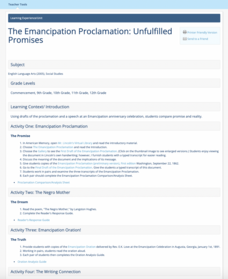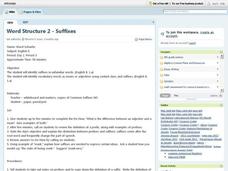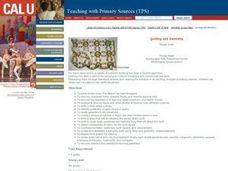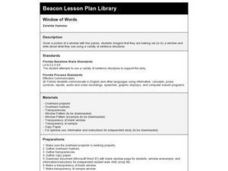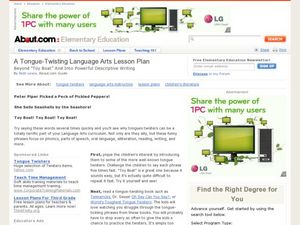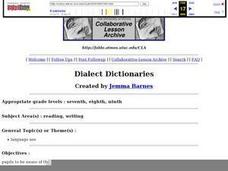Brigham Young University
Bloom’s Taxonomy: Questions for Harry Potter and the Chamber of Secrets
As part of their study of Harry Potter and the Chamber of Secrets, readers respond to a series of questions based on chapter eight of J.K. Rowling's second novel in the series about the famous young wizard.
Curated OER
We the People: An American Government Project
High schoolers identify key representatives in the legislative and executive branches of the Federal and State governments
Curated OER
"Father" of Our Country vs. "Father" of the Bill of Rights
Students examine the relevance of the Bill of Rights. In this Bill of Rights lesson, students study the parts of the Constitution and the ten amendments. They investigate the rights and responsibilities that accompany being an American....
Curated OER
The Emancipation Proclamation: Unfulfilled Promises
Young scholars perform research into the Emancipation Proclaimation. The document will aid learners in understanding the history and culture of the time of writing. Finally critical thinking skills are used to formulate contextual meaning.
Curated OER
Literary Response and Analysis Theme Literature
Analyze the central idea or literary theme found in a series of quotes from the Shakespearean play, Hamlet. For literary analysis, learners paraphrase excerpts from the play and then identify the characters' motivations for their speech.
Curated OER
Understanding the Declaration of Independence
Students work in groups to do a document analyxix of several documents. Students view the Martin Luther King speech, "I Have a Dream." They discuss the Battle of Saratoge. Students give a personal view of the reason the Declaration of...
BBC
Walk Through History
First the Vikings raided Great Britain, and then they set up camp and moved in. Learners explore Viking times and discuss reasons why groups choose to settle. They construct a class timeline, engage in several online activities, and then...
Curated OER
The Alphabet is Historic: The Roman Alphabet is our Alphabet
Pupils show that the Greeks, Phoenicians and Romans lived in the Mediterranean area. They give reasons why the alphabet was important for the Romans. and say that the Romans developed the alphabet they are learning in school.
Smithsonian Institution
Giving Speeches: George Washington's First and Second Inaugural Addresses
Students discuss the purpose of the President of the United States giving an inaugural address. They describe their impressions of any inaugural speaches they have heard or read. Students research events leading up to Washington's first...
Curated OER
Connecting Ideas Using Coordinating
Students recognize and use coordinating junctions. They also explore subordinating conjunctions.
Curated OER
Amazing Adjectives
Fourth graders compose sentences that use descriptive adjectives to describe a specific food and day that they both like and dislike. They should really enjoy coming up with words that describe their favorite and least favorite foods!
Curated OER
A Sneaky Poem
Third graders incorporate a subject and its synonym, and the parts of speech to create a Sneaky Poem. After a lecture/demo, 3rd graders begin writing their poems, and have their classmates act as peer reviewers before final submission.
Curated OER
Language Arts: How Can Research Shape Ideas?
Young scholars are able to characterize arsenic and determine its potential health threats in writing. They are able to compare and contrast arsenic to other water pollutants using Venn diagrams. Students are able to demonstrate essay...
Curated OER
Word Structure 2 - Suffixes
Eighth graders identify suffixes in unfamiliar words. They identify vocabulary words as nouns or adjectives using context clues and suffixes. They review the definition of a prefix, along with examples of prefixes and explain the...
Curated OER
Geometry and Quilting
Students create a quilt square for a class quilt using at least three, two-dimensional geometric figures. They research and write a brief description of at least two different quilt patterns that they find. Pupils discuss that quilts are...
Curated OER
Window of Words
Young scholars imagine that they are looking out (or in) a window with four panes and write about what they see using a variety of sentence structures. They create a paragraph about what they see looking through their window on...
Curated OER
Map Your State: Regions of Arizona
Fourth graders define vocabulary and locate physical features on maps. In this mapping lesson plan, 4th graders explore regions of Arizona through landforms found on topographic maps. Students research the history and culture...
Curated OER
Amazonian Travel Brochure
Learners create a brochure. In this Amazon research lesson, students research a tourist attraction in the Amazon and develop a travel brochure.
Curated OER
Escape from Reality: Miro and Surrealism
Students examine the artwork of Joan Miro. In this art appreciation lesson, students research the life and work of Miro as a surreal artist. Students create their own surreal art as they follow Miro's techniques.
Curated OER
Harcourt Story: Eleanor and Amelia Go for a Ride
Fourth graders are introduced to a list of vocabulary words as it relates to the story Eleanor and Amelia Go for a Ride and a use graphic organizer to clarify the meaning of the text. In this "Eleanor and Amelia Go for a Ride"...
Curated OER
A Tongue-Twisting Language Arts Lesson
Students discover enunciation and alliteration by reading tongue twisters in class. In this language arts lesson, students listen and repeat some of the classic childhood tongue twisters along with their teacher. Students...
Curated OER
Get Rid of It!
Students participate in matching game to practice their phonics awareness. They can apply the activity to any curriculum review that is word or vocabulary based.
Curated OER
Land Use Issues
For this unit of lessons, students examine analogies and parts of speech. They use land use issues to identify the different parts of speech that they research. They create analogies about the origin of organisms.
Curated OER
Dialect Dictionaries
Students list non-standard English words they use in their community dialect. They create dictionary definitions for 15 of the words they come up with including: pronunciation, part of speech, definition and example of usage. They create...



